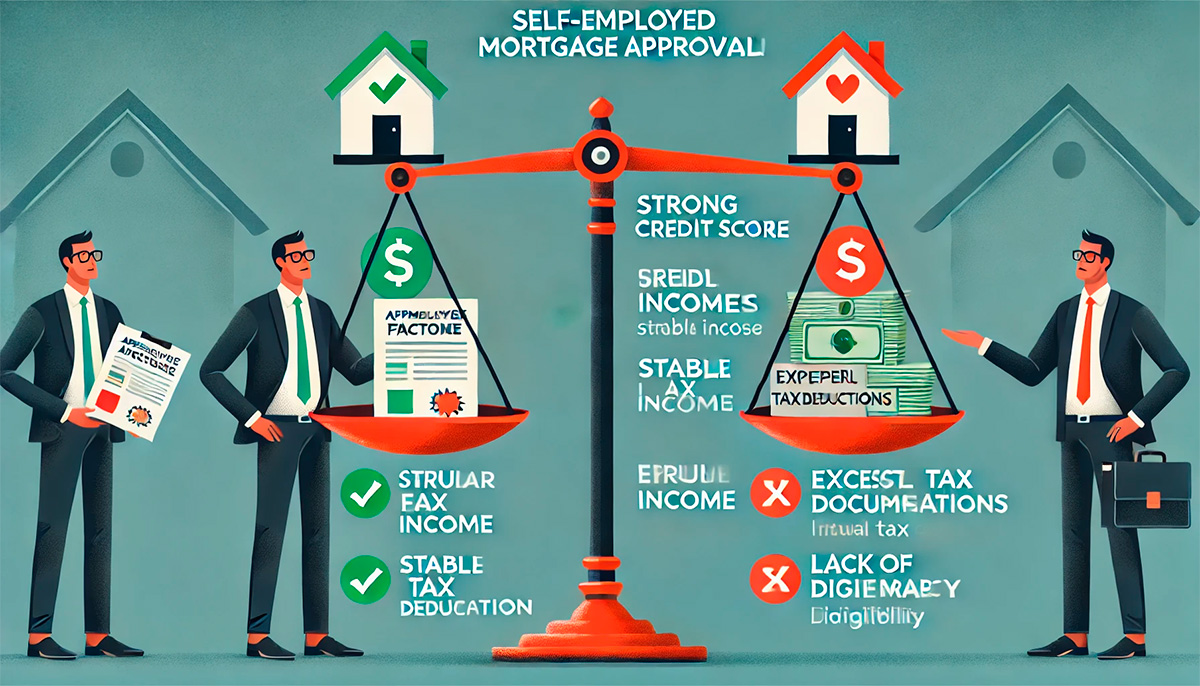For self-employed individuals, securing a mortgage can feel like an uphill battle. Unlike traditional employees who receive a steady paycheck, self-employed borrowers often have fluctuating incomes, making it challenging to prove financial stability to lenders. However, getting approved for a mortgage as a self-employed individual is not only possible but increasingly common. This article explores the unique challenges self-employed borrowers face, the documentation required, and strategies to improve your chances of mortgage approval.
Understanding the Challenges for Self-Employed Borrowers
Self-employed individuals often face additional scrutiny from lenders due to the perceived instability of their income. Unlike salaried employees, whose income is consistent and easily verifiable, self-employed borrowers may have irregular earnings, making it difficult for lenders to assess their ability to repay the loan. Additionally, self-employed individuals may deduct business expenses from their taxable income, which can reduce their reported earnings on paper, further complicating the approval process.
Despite these challenges, many lenders recognize the growing number of self-employed professionals and have adapted their underwriting processes to accommodate them. By understanding the requirements and preparing thoroughly, self-employed borrowers can successfully navigate the mortgage application process.
Documentation Required for Self-Employed Mortgages
When applying for a mortgage as a self-employed individual, you’ll need to provide extensive documentation to prove your income and financial stability. Lenders typically require the following:
- Tax Returns: Most lenders will ask for at least two years of personal and business tax returns. This helps them assess your average income and identify any trends or fluctuations.
- Profit and Loss Statements: These documents provide a detailed overview of your business’s financial performance, including revenue, expenses, and net income.
- Bank Statements: Lenders may request several months of personal and business bank statements to verify your income and expenses.
- Business Licenses and Registrations: Proof of your business’s legitimacy, such as licenses or registrations, may be required.
- Credit History: A strong credit score is essential for mortgage approval. Lenders will review your credit report to assess your creditworthiness.
Providing accurate and complete documentation is crucial for demonstrating your financial stability and increasing your chances of approval.
Strategies to Improve Your Chances of Approval
While the mortgage application process can be more complex for self-employed individuals, there are several strategies you can use to improve your chances of approval:
1. Maintain a Strong Credit Score
A high credit score is one of the most important factors lenders consider when evaluating mortgage applications. Pay your bills on time, reduce outstanding debt, and avoid applying for new credit in the months leading up to your mortgage application.
2. Minimize Deductions on Tax Returns
While it’s tempting to maximize deductions to reduce your taxable income, doing so can lower your reported earnings and make it harder to qualify for a mortgage. Consider working with a tax professional to strike a balance between minimizing taxes and maximizing your reported income.
3. Save for a Larger Down Payment
A larger down payment reduces the loan-to-value (LTV) ratio, which can make lenders more willing to approve your application. Aim to save at least 20% of the home’s purchase price for the down payment.
4. Stabilize Your Income
Lenders prefer borrowers with stable and predictable income. If possible, avoid making significant changes to your business structure or income streams in the years leading up to your mortgage application.

5. Work with a Mortgage Broker
Mortgage brokers specialize in connecting borrowers with lenders and can help you find lenders who are more willing to work with self-employed individuals. They can also guide you through the application process and help you prepare the necessary documentation.
Types of Mortgages for Self-Employed Borrowers
Self-employed individuals have several mortgage options to choose from, each with its own pros and cons:
| Mortgage Type | Description |
|---|---|
| Traditional Mortgages | These require extensive documentation but often offer the best interest rates and terms. |
| Bank Statement Loans | These loans use bank statements instead of tax returns to verify income, making them ideal for borrowers with significant write-offs. |
| Non-Qualified Mortgages (Non-QM) | Non-QM loans have more flexible underwriting criteria and may accept alternative forms of income verification. |
| Portfolio Loans | These loans are held by the lender rather than sold on the secondary market, allowing for more flexible terms. |
The Role of Financial Advisors in Securing a Self-Employed Mortgage
Navigating the mortgage application process as a self-employed individual can be daunting, but working with a financial advisor can make a significant difference. Financial advisors specialize in helping individuals manage their finances and achieve their goals, including homeownership. For self-employed borrowers, a financial advisor can provide personalized guidance on improving credit scores, organizing financial documents, and creating a budget that aligns with mortgage requirements.
One of the key benefits of working with a financial advisor is their ability to help you present your financial situation in the best possible light to lenders. They can assist in preparing profit and loss statements, tax returns, and other documentation to ensure they meet lender requirements. Additionally, financial advisors can help you identify areas where you can reduce expenses or increase income to improve your debt-to-income ratio, a critical factor in mortgage approval.
Financial advisors can also help you explore alternative mortgage options, such as bank statement loans or non-QM loans, which may be more suitable for your unique financial situation. They can connect you with lenders who specialize in working with self-employed borrowers and negotiate favorable terms on your behalf. Furthermore, a financial advisor can provide long-term financial planning, helping you build an emergency fund, save for a larger down payment, and improve your overall financial health.
In addition to their expertise, financial advisors offer peace of mind. The mortgage application process can be stressful, especially for self-employed individuals who face additional scrutiny. Having a trusted professional by your side can alleviate some of this stress and ensure that you make informed decisions throughout the process. Whether you’re a freelancer, small business owner, or independent contractor, a financial advisor can be an invaluable resource in achieving your homeownership goals.
Conclusion: Achieving Homeownership as a Self-Employed Borrower
Securing a mortgage as a self-employed individual may require extra effort, but it is entirely achievable with the right preparation and strategy. By understanding the challenges, gathering the necessary documentation, and working with experienced professionals, you can improve your chances of approval and achieve your dream of homeownership.
Remember, the key is to demonstrate financial stability and reliability to lenders. Whether you opt for a traditional mortgage, a bank statement loan, or a non-QM loan, there are options available to meet your needs. With persistence and careful planning, you can navigate the mortgage process successfully and secure the home you’ve been working so hard for.



